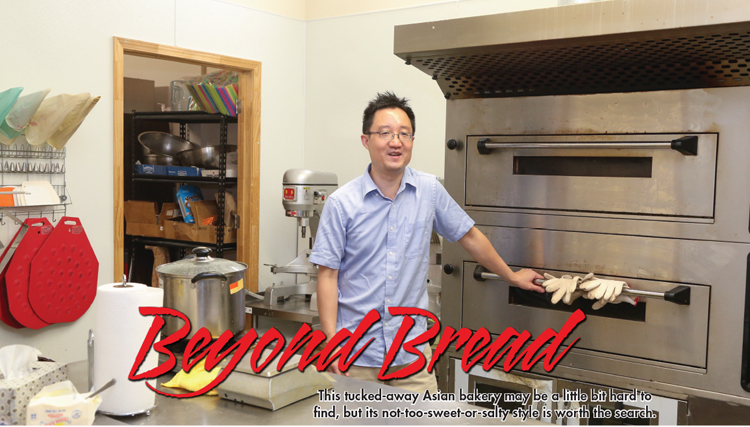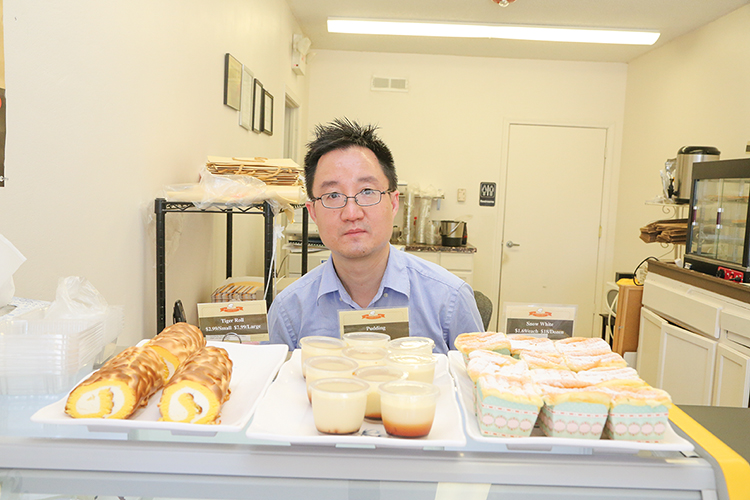This tucked-away Asian bakery may be a little bit hard to find, but its not-too-sweet-or-salty style is worth the search.
| 2019 Q3 | story by writer Bob Luder | photos by Steven Hertzog

Hamlet Chang, Owner of Formosa Bakery
Tucked back in a white, nondescript strip mall a block off of 25th and Iowa streets in south Lawrence between a spa and nail salon sits Formosa Bakery, one of just a few Asian bakeries in the city, state and region. It’s in this modest two-room space that proprietor and sole employee Hamlet Chang creates and bakes his breads, desserts and snacks that, on the surface, don’t appear all that different from what one might find in any other bakery in town.
Puddings and custards, cream puffs, cheese bites, chocolate jelly rolls, cakes, tiramisu, pillow-top cheesecake: They all look pretty standard. There also is the baked-daily bread, stuffed with anything from taro, red beans, corn and ham to coconut and shredded pork.
But then there’s the taste. Chang says the secret to being an Asian bakery isn’t necessarily what you bake but how you bake it.
“Not too sweet, not too salty,” he says with a proud gleam in his eyes.
Indeed, taking a bite into one of Chang’s creations is experiencing a willowy light texture with a hint of sweetness but nothing that ever would be considered rich. The pudding is creamy, the breads are soft, the shortcake spongy. It’s all full of flavor without being overly dense, sweet or salty.
It’s what makes Formosa worth seeking out. And therein lies the challenge. Street visibility: zero. Signage: except for a small logo stating “Formosa Bakery Since 2013” painted on a window, not much. To find the Bakery, one better have a top-notch navigation system and, even then, a keen eye picking out the small bakery among the spas and salons. And yet, during the school year for the University of Kansas, Chang has hordes of students from China and other east-Asian countries trekking through his door to sample his creations.
He says he wouldn’t have it any other way.
“I have a loyal base of customers that’s enough to keep me in business,” he says. “My clientele mostly comes from (the roughly 1,000) Chinese students. Also, there are not many Asian bakeries in Kansas, so I get business from Kansas City, Topeka, even Manhattan.”
Chang, who turns 40 this year, adds, “I also have the freedom of closing and taking vacation when school is out in the summer. I can take up to two months of vacation a year.”
Chang closed the bakery for the month of July and returned to his native Taiwan to visit family and friends before returning for the start of the University of Kansas’s (KU) fall semester in August.

Hamlet Chang with some of his creations
Asia to Lawrence and Back and Back Again
To understand Chang’s philosophy in running his business, one must first learn his backstory.
He was born the middle child of three sons in Kaohsiung, Taiwan, and spent most of his formative years there before his family immigrated to Lawrence when Hamlet was 17.
“I had an uncle who lived here and was a KU graduate,” he says. “He had his own business here. My father saw opportunities to make a good life here.”
After finishing his final year of high school here, it only seemed natural that Chang enroll at KU. He graduated from the School of Business and earned his master’s degree in economics in 2005.
Then he decided to return home to Taiwan.
“By then, I just wanted a change in environment,” Chang says. “I’d stayed here too long. I moved to Taipei. If I want to work in Taiwan, I have to serve some time in the military, so I served in the military for a year and four months.”
Upon finishing his military service, Chang landed a job back in his hometown of Kaohsiung, a coastal city in southern Taiwan. For the next year, he worked with ships in that city’s port on logistics and accounting. But he grew restless with his duties there and sought employment he thought more matched his education and aspirations. He moved to Vietnam and landed a sales job with a company there.
“I stayed another year and decided not to stay in Asia,” he says. “I found that sometimes in sales, you do positive work and still don’t get a good result. You feel like you work for nothing.”
Chang decided he’d return to Lawrence, a place away from his hometown where he felt comfortable. Only, he needed to figure out what he was going to do when he got here.
“I wanted to open a restaurant,” he says, “but there were already a lot of Asian restaurants in Lawrence. But there weren’t many Tai bakeries in town. I decided it was good timing (to try that).”
First, however, Chang needed to learn how to bake. Through some searching, he found a cake shop in Kaohsiung that offered a six-month baking class. He found he took to the process of baking right away.
“I like that you can see the results right in front of you,” he says.
Chang’s KU education gave him a good framework of knowledge in how to run a business. In 2013, he opened Formosa Bakery, naming it after the former name of his country, a Taiwanese word that translates to “beautiful island.”
Don’t think because he takes two months off each year that Chang is a slacker. When students are in session and the bakery is open, he routinely puts in 12-hour days and 70-hour weeks. A typical workday begins at 8 a.m. He bakes through the day until the shop opens at 3 p.m. and typically stays at the bakery until 8 p.m., an hour after closing, to clean up.
Reading the Tea Leaves
Chang says he’s had opportunities during the last six years to expand his business, even franchise it, but has declined. Actually, he hasn’t really given the idea much consideration.
“I try to keep the business as small as possible to keep expenses down,” he says. “Keep it simple. It’s easier. I have no employees. I can take vacation whenever I want.
“There are other bigger places that make more money,” he continues. “But they don’t have the freedom I do. I’m happy with the way it is.”
Chang does express concern that the Chinese student population at KU appears to be waning. Because of current U.S.-China relations and bubbling trade wars, many young Chinese are choosing to further education in Australia or Europe.
“Business is OK,” Chang says. “But I think it will go down.”
To try and counter that trend, Chang began contracting this year with Starve Bird, a food-delivery service. He’s considered tapping into apps such as Uber Eats but says his current business is strong enough that it doesn’t make sense to pay the 30-percent user fee.
“I know my location is not great,” he says. “Maybe I can get an app that people can use to find me.”
Until then, Chang says he’ll rely on his loyal customer base in a city that champions diverse businesses such as Formosa Bakery.
“Lawrence is not like other cities in Kansas,” he says. “There’s more diversity here, which is better for me.” p
